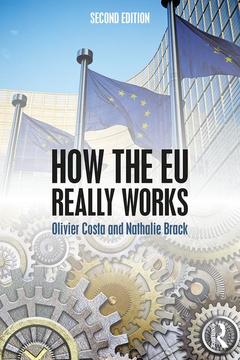How the EU Really Works (2nd Ed.)
Auteurs : Costa Olivier, Brack Nathalie

The European Union is facing a profound crisis and is confronted with multiple challenges. Over the last two decades, it has experienced a series of dramatic changes to its powers, its institutional design, its constitutional framework and its borders. The current political, economic and financial crisis puts the EU?s legitimacy further under pressure and creates the impression of a turning point.
This book provides a concise analysis of the EU and its dynamics by paying particular attention to its day-to-day operation. It aims to help students and scholars understand its evolution, its institutions, its decision-making and the interactions between the EU and various actors. Avoiding abstract theorizing, the authors propose an easy to read analysis of how the Union works while recognizing the complexity of the situation. Throughout the book, the key issues of European integration are addressed: democratic deficit, politicization, the role of member states, institutional crisis and citizen involvement.
This edition has been fully updated to include:
- Brexit, the migration crisis as well as the consequences of the 2014 EP elections for all the EU institutions;
- An in-depth analysis of the 2014 EU elections;
- More empirical data across the board;
- New developments in EU decision-making such as the trialogues, and differentiated integration;
- More in-depth discussion of the role of interest groups in EU policy-making.
This text is of key interest to students, scholars and readers interested in European Union politics and studies.
Introduction 1. A Political System Forged by History 2. The Main Theoretical Approaches in EU Studies 3. Executive Power 4. The Legislative Power 5. Organs of Control 6. Other Organs Involved in EU Policy-Making 7. Decision-Making in the European Union 8. EU Decision-Making Models 9. The EU Decision-Making Process from a Public Policy Network Perspective Conclusion
Olivier Costa is CNRS Research Professor at the Institute of Political Studies of Bordeaux, France. He is also Director of European Political and Governance Studies at the College of Europe in Bruges, Belgium, and co-director of the Jean Monnet European Centre of Excellence of Aquitain in Bordeaux, France. He is associate-editor of the Journal of European Integration, and member of the editorial board the Journal of Legislative Studies and the Italian Political Science Review.
Nathalie Brack is Assistant Professor in the Department of Political Science and at the Institute for European Studies of the Université libre de Bruxelles (Cevipol), Belgium. She is also Visiting Professor at the College of Europe in Bruges. Her research has been published in JCMS, the Journal of European Integration and the International Political Science Review among others.
Date de parution : 07-2018
15.6x23.4 cm
Disponible chez l'éditeur (délai d'approvisionnement : 14 jours).
Prix indicatif 46,39 €
Ajouter au panierDate de parution : 07-2018
15.6x23.4 cm
Disponible chez l'éditeur (délai d'approvisionnement : 14 jours).
Prix indicatif 160,25 €
Ajouter au panierThèmes de How the EU Really Works :
Mots-clés :
EPP Group; European Union; European Public Prosecutor’s Office; Brack; Joint Undertaking; Costa; Interparliamentary Cooperation; European Integration; Inter-parliamentary Cooperation; European Parliament; MFF; Euroscepticism; National Parliaments; Eurozone; Enhanced Cooperation; EU; EEC Treaty; Nathalie Brack; EU’s Institutional Framework; economic crisis; EU’s Architecture; EU policy-making; EU Political System; EU financial crisis; West Germany; EU's legitimacy; Monti Ii; political crisis; Broader Political Science Literatures; European Anti-Fraud Office; EU Expenditure; Single Legal Status; Vat Fraud; EU’s Legitimacy; Intergovernmental Method; EU’s Financial Interest; EU’s GNI; EU’s Agendum; EU Policy Make



